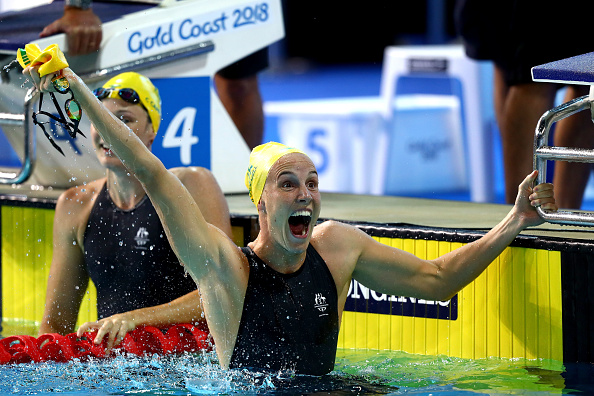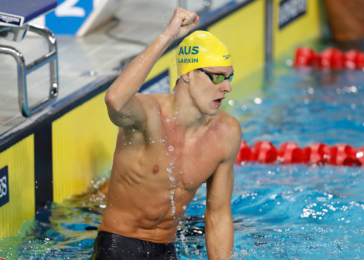
IMAGE|| GETTY IMAGES
Australia’s all-conquering Commonwealth Games swim team continued to scoop the Optus Aquatic Centre pool in a night which saw little sister Bronte Campbell swim faster than she’s ever swum to upset big sister Cate in a 100m freestyle showdown for the ages.
The Australians charged to a record breaking Games medal haul of 60 with still one night’s swimming remaining.
After the fifth night of competition the Australians had won 20 gold, 20 silver and 20 bronze medals – surpassing the 57 medals the team won in Glasgow (from 44 events).
And the 20th gold medal went to a shocked Bronte Campbell in a new Games record, a personal best and the equal fourth fastest time in history of 52.27 who upset sister Cate (52.69) with remarkable 17-year-old Canadian Taylor Ruck (53.08) right on their heels to win her seventh medal of these Games.
Cate went out in 25.02 followed by Ruck in 25.29 and Bronte third in 25.47 and it was Ruck who moved on Cate down the next 25 metres and then just when it looked like Cate would hang on, it was Bronte, thinking it may well be her last race of the year who pounced in the final stages to snatch the gold from her big sister.
“That was incredible,” said Bronte.
”I didn’t know I could swim that fast, I really didn’t expect to be going so quick, so I’m just excited, I haven’t swum a personal best in the 100 free for three years.
“This is the fastest I’ve swum in three years in a final, so to come away with gold is really special.
“It seems like I’ve worked myself to a really good space, and taking a break seems like a bit of a waste but I know I have to and that’s why I made that decision before I came here, regardless of results, you have to take the break, you have to get ready for the next two years because Tokyo is a long way away.
“I’m banking on about three months but we’ll see how everything goes with three months of intense rehab and then we’ll see how we’re feeling after that and I’ll play it by ear.
“I’ve got until June next year before trials. I’ve ruled myself out of Pan Pacs to get this rehab done, so I’m giving myself enough time to get back in top condition for 2020.
“I was 100 percent going out there thinking it was my last race for the meet, my last race for possibly the year, so we’ll see how we go.
“I might have to do the relay now, but Cate also had an amazing split in the relay so if she did the relay, I would be stoked.
“She’s obviously incredible and she’d do a great job for them but yeah I was thinking this was my last race.
“It’s definitely restored some self-confidence, it’s been a while since I’ve thought I could go faster than I had gone, it’s restored a bit of belief into myself. I’ll take that into my break and I’ll see where that gets me.
“You can’t take that for granted. There’s only so many people in the world that can step up on the podium, so to be on the podium is something we shouldn’t ever take for granted, so I just wanted to share that with her.”
Meanwhile Mitch Larkin started the night for Australia with a sizzling last lap to become the first swimmer in the last five Commonwealth Games to win the 50, 100 and 200m backstroke treble when he led the first sweep of the night.
The 24-year-old Queenslander clocked a time of 1:56.10 but had to pull out all stops to beat the strongly-built NSW Central Coast lifesaver Bradley Woodward (1:56.57pb) and fellow Olympian Josh Beaver (1:57.04).
The treble is just reward for Larkin – dual world champion in 2015 and Olympic silver medallist in 2016 who slumped to struggle street in 2017 but who revived his career under coach Dean Boxall in 2018.
“After last night I sort of thought (the treble) might be possible, I knew I had to post a good time tonight, I saw that Brad was swimming well,” said Larkin.
“I was quite nervous going into that, not because of the triple, but maybe because it’s the favourite of the backstroke events and I’ve got a lot of pride involved in it.
“People kept saying it’s never been done, and I never knew that. It’s amazing to make history but obviously this medal represents so much and this week has been so powerful coming back in my career and a hiccup or whatever you want to call it last year. To finally get my groove back, it means so much more than simply a gold medal.”
“The plan is to build my swims from here on. So Pan Pacs, trials and then Pan Pacs, and then keep the ball rolling into Worlds and hopefully 2020.
And for Woodward, the move to leave home from Shelly Beach on the NSW Central Coast to the western suburbs of Sydney and coach Adam Kable at the Sydney Olympic Park Aquatic Centre certainly changed the fortunes of the champion lifesaver, who took it to Larkin for the first 175 metres.
Woodward led the Olympic silver medallist and defending champion until Larkin found something extra to edge in front and win by less than half-a-second.
And a great job by Rio Olympian Beaver, under coach Olympic silver medallist Ash Delaney in Northcote in Melbourne, delighted to make it a clean sweep for the Aussie backstrokers.
Then came the women’s 800 metres freestyle, one of the glamour events on the program and it was Brisbane schoolgirl, the proud Tasmanian, Ariarne Titmus (8:20.02pb) who led from start to finish to lead Australia’s amazing fifth clean sweep with two-time Olympian Jessica Ashwood (8.27.60) and Games debutant Kiah Melverton (8:28.59pb) powering home to ensure another 1-2-3 for the Dolphins.
Considering Australia has not won this event since 1998 – no medal in 2014 in Glasgow and bronze and silver respectively to Mel Gorman in 2010 and 2006.
Titmus opened up a commanding lead through the first 200m (2:01.81) and 400m (4:08.20) before Ashwood started to move through in the next 200m. But Titmus, a silver medallist earlier in the meet in the 200m kicked again over the final 200m to score an impressive victory in the slightest of PBs.
“Just amazing to win and go 1-2-3…after seeing the boys do it in the backstroke we thought maybe it was also a chance for us. I wanted to go a bit quicker but at a meet like this it’s about racing and you know, sometimes at these big meets it’s not the fastest time that you’ve raced that wins, but I’m happy to be the first person to get my hand on the wall,” said Titmus.
“It’s exciting. When I moved to Dean (Boxall) a couple of years ago, to think that I’d be in this position, I’d probably think I was dreaming. I’ve worked hard to be here and it’s great to see the hard work is paying off.
“Individual gold means a lot….to know you’ve done it yourself, obviously winning a relay is great but I think that satisfaction of being Commonwealth champion is really exciting and I’m happy I could perform well tonight. “
Matt Levy, the most experienced Australian Para-swimmer at the Commonwealth Games, put on a masterclass tonight on his way to victory in in the men’s S7 50m freestyle final. The 31-year-old from Sydney’s North Shore touched the wall in 28.60 ahead of South Africa’s Christian Sadie (29.65) and Wei Soong Toh (29.83) from Singapore.
A stalwart of the Australian Paralympic Team with experience from four Paralympic Games dating back to Athens 2004, there are few firsts left for Levy to claim. Today, as a debutant on the Australian Commonwealth Games swim team, he ticked two more off his list by winning Commonwealth gold at his first attempt. Incredibly, it took him several moments to even realise he had won.
Although he competes against athletes with physical impairments, Levy also has a vision impairment.
“I had an inkling that I’d won because the camera was in my face and I heard the event commentator over the speakers, but I wasn’t sure,” he said. “I couldn’t see the board but I was pretty sure I had won a medal.”
Rohan Bright and Matthew Haanappel raced strongly against teammate Levy, placing fifth and sixth in 30.71 and 30.75 respectively. S6 swimmer Haanappel was the only athlete in his classification against the field of S7 athletes.
Rio 2016 Paralympians Paige Leonhardt and Madeleine Scott asserted themselves as two of the fastest, claiming silver and bronze respectively in the SB9 100m breaststroke final. The triumph for Leonhardt resulted in her first international medal, while the bronze medal proved to Scott that she has so much more to give in her burgeoning swimming career.
Leonhardt (1:18.81) who surged forward to cement her position in the last 30 metres of the race, to finish less than one second behind nine-time Paralympic champion Sophie Pascoe from New Zealand (1:18.09) was ecstatic with her result, and coming so close to an athlete she admires is the icing on the cake to an incredible meet.
“I’m over the moon, I’m feeling lost for words. That was a really good swim for me, but the feeling of racing in front of 10,000 people who are probably mostly Australian and are cheering for you, it’s amazing,” said the 17-year-old.
“I’m so glad I could achieve my first international medal on home soil. That’s pretty exciting for me. I used to say that I’m a butterflier, but I think I can go back home and say that I’m a breaststroker. That’s really exciting.”
Melbourne local Scott (1:19.98) was proud to have won bronze, but knew she had more to give if she hadn’t found herself with a case of the shingles earlier in the week. Jasmine Greenwood was the third Para-swimmer competing in that event tonight, and finished in a time of 1:25.23.
In the men’s 50 metres freestyle Cam, McEvoy (22.00), James Roberts (22.11) and James Magnussen are (22.20) are the second, third and fourth fastest qualifiers respectively.
And judging by the pace shown by new Games record holder, Englishman Ben Proud, the boys could well be swimming for the minor medals – but then again stranger things have happened in this meet which has offered up more than a few surprises.
Proud’s personal best of 21.30 was faster than his heat swim this morning of 21.45 – and after being disqualified in the 50m butterfly another record breaking swim will be on the cards on the final night.
There were also medals for:
– Southport’s Laura Taylor (2:07.39) silver and Emma McKeon (2:08.05) bronze behind Alys Thomas (2:05.45 Games record) in the women’s 200m butterfly;
– Bronze to Georgia Bohl (1:07.22) behind South Africa’s Tajana Schoenmaker (1:06.41) and Canadian Kierra Smith (1:07.05) in the women’s 100m breaststroke, and;
– A well-deserved bronze to Bohl’s Griffith University training partner Grant Irvine (51.50) in the men’s 100m butterfly which saw remarkable South African champion Chad Le Clos (50.65 Games record) win his record breaking 16th Games medal with England’s James Guy (51.31) taking bronze.
– While 2012 Olympic champion, South African Cameron Van der Burgh (26.58) upset world record holder and pre-race favourite England’s Adam Peaty (26,62) and his countryman and 200m winner James Wilby (27.37) with Australia’s Jake Packard (27.53) and James McKechnie (27.59) fourth.
In semi-final action: Australia’s Emily Seebohm (27.89) is the second fastest and Holly Barratt (28.12) the fourth through to the 50m backstroke final


